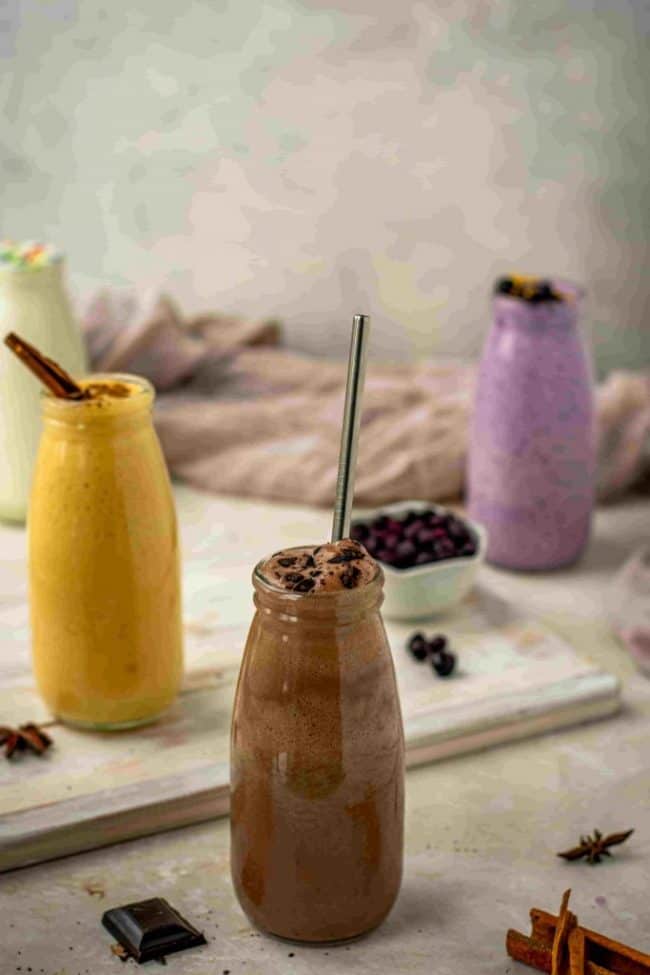Splenda is a highly controversial sweetener. Some keto dieters love it, while others stay away. But is Splenda keto and is it really healthy?
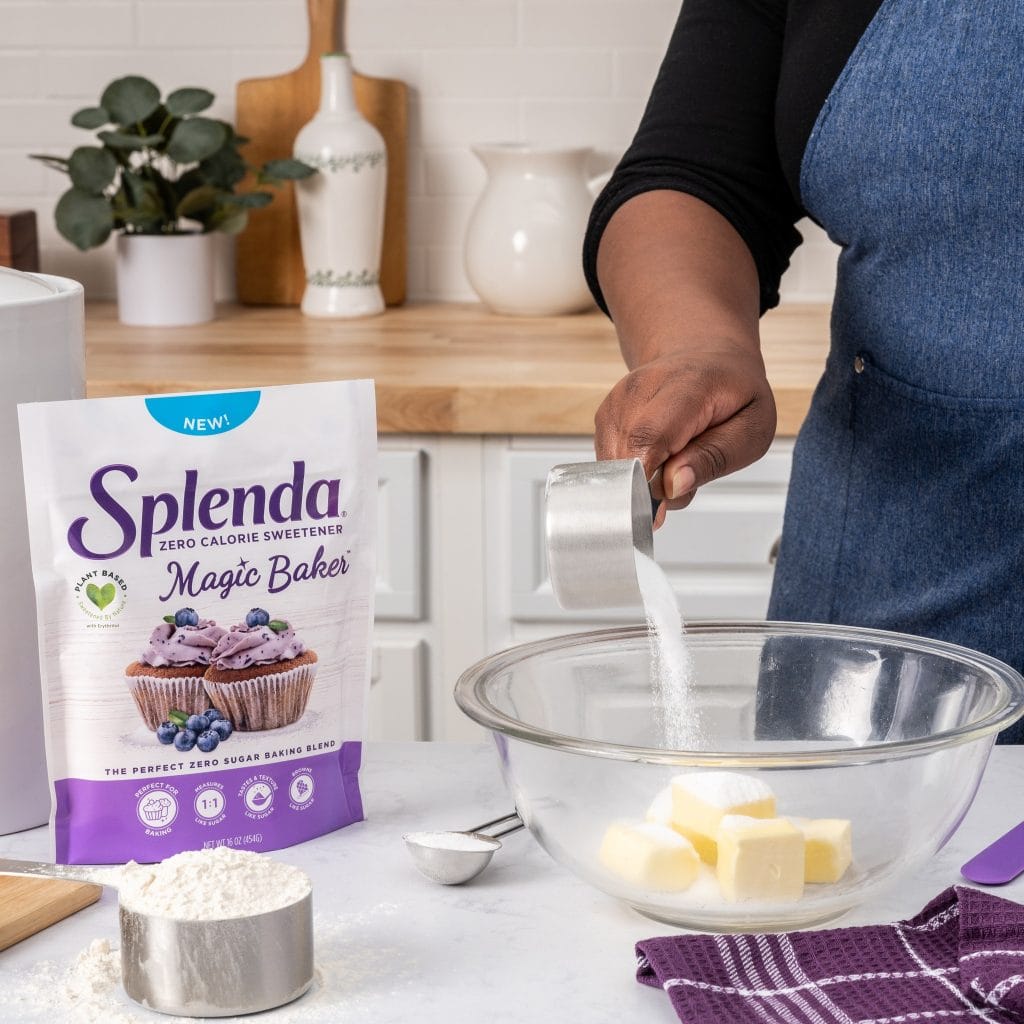
This guide will answer all your questions about Splenda. We’ll analyze multiple studies to find out if it’s a good option on keto.
Can You Have Splenda On Keto?
Splenda is a company that produces sweeteners using sucralose, maltodextrin and dextrose. A packet contains one gram of carb, so it won’t impact ketosis.
However, there are some concerns to account for.
Research shows that the maltodextrin in Splenda spikes blood sugar and insulin levels due to the GI or glycemic index score of 110.
Fortunately, Splenda is 600 times sweeter than sugar, so you don’t need much. If you’re consuming it in small amounts, the health drawbacks are minimal, and you won’t have to worry about hampering ketosis or weight loss.
How Many Carbs Are Really In Splenda?
One packet of Splenda has a gram of total carbs and three calories. But you only require a little because it’s so sweet, making it practically a zero-calorie and zero-carb sweetener.
You must limit your carb intake to under 30 grams to maintain ketosis. So from a macronutrient standpoint, it may look like you can have as much Splenda as you like.
This isn’t the case. Research proves that Splenda harms your gut microbiome, which directly affects weight loss. If you’re struggling to lose weight, but your keto diet is on point, try removing Splenda and other artificial sweeteners.
Sucralose can also produce harmful byproducts if exposed to high temperatures. So I suggest avoiding it when baking and cooking and only using it to sweeten cold drinks.
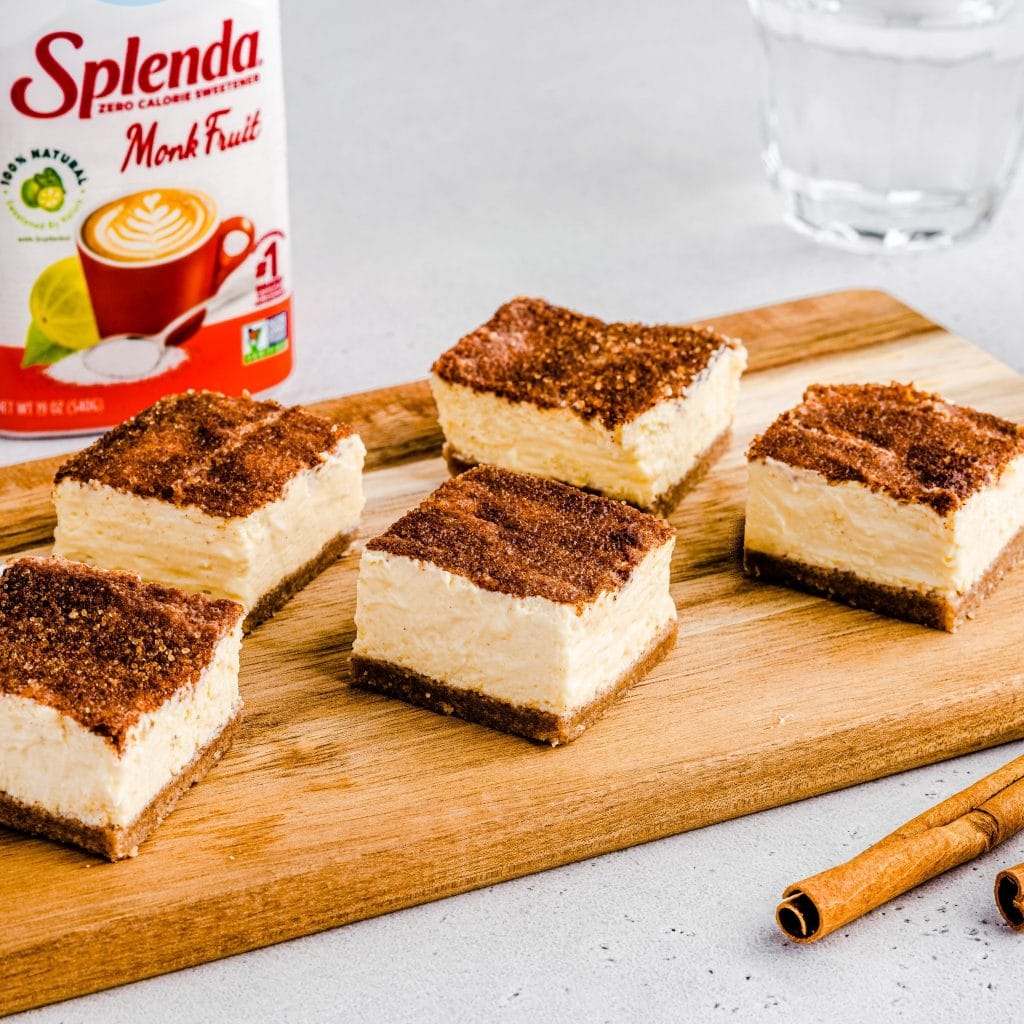
Keto Friendly Sweeteners
Try these ketogenic diet sweeteners because they are far healthier and tastier than Splenda:
- Erythritol
- Monk fruit sweetener
- Allulose
- Stevia
- Inulin
Erythritol
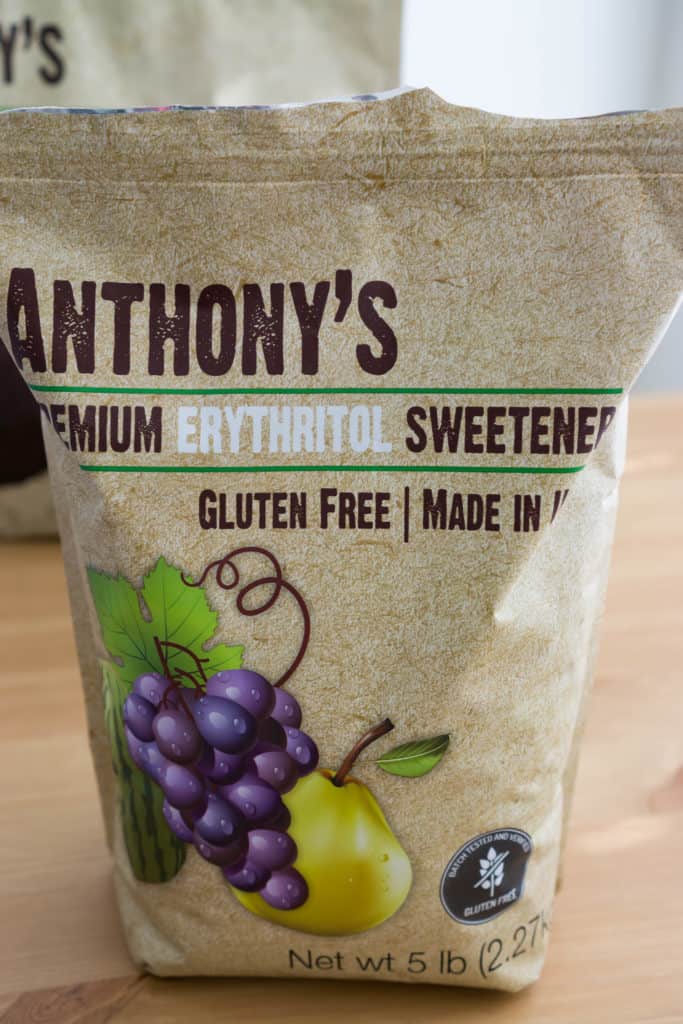
Our go-to keto sweetener is granular erythritol. Your body doesn’t metabolize it, so you can enjoy this tasty sweetener without interfering with ketosis.
If you’re trying to lose weight, you’ll be happy to know that a teaspoon has one calorie, so it won’t stall weight loss.
Unlike Splenda, erythritol is also heat stable, making it perfect for cooking and baking.
I’d suggest grinding your erythritol or buying the powdered version if you’re preparing frozen desserts like cheesecake. This is because the granules remain whole, and you’ll bite into them, giving desserts an unwanted crunchy texture.
Pros
- It has zero calories and carbs
- The GI score is one
- Our bodies can’t absorb it, so it’s excreted in urine
- Its heat stable
- It improves your oral health
Cons
- It can cause cramping and bloating if you’re sensitive to sugar alcohols
- Erythritol isn’t approved by the FDA
Monk Fruit Sweetener
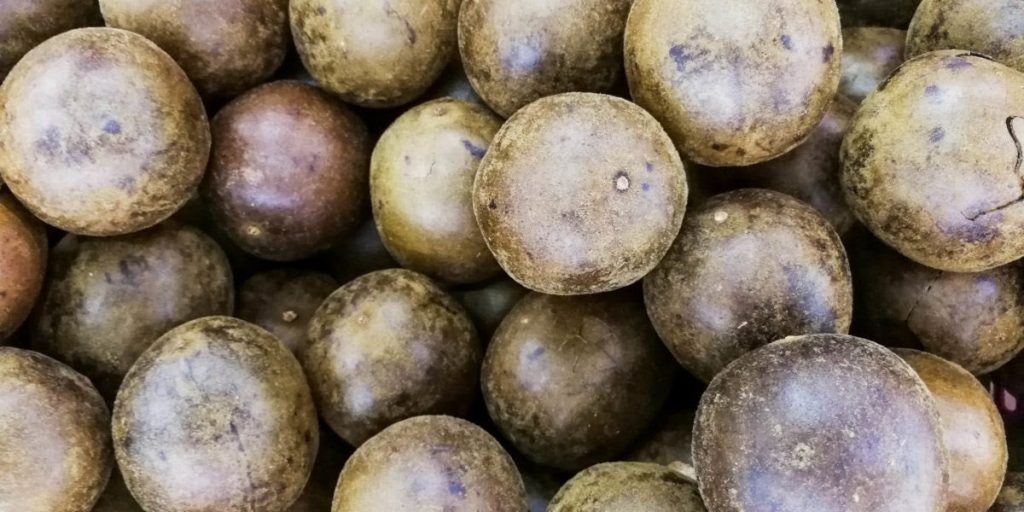
If you’re not a big fan of artificial sweeteners and sugar alcohols, opt for organic monk fruit sweetener.
Monk fruit has zero carbs and calories, so you can eat as much as you want.
What’s unique about monk fruit is that it contains mogrosides, which are potent antioxidants that reduce inflammation.
The only drawback is the taste. Monk fruit doesn’t taste like regular sugar. Instead, it has a licorice aftertaste you’ll need to get used to.
I like combining monk fruit sweetener and erythritol when preparing desserts. It complements each other well because the aftertaste is less intense, and you won’t get the bloating, gas and diarrhea associated with erythritol.
Pros
- It’s 100 percent natural
- The mogrosides content fights inflammation
- It’s a zero-calorie sweetener
- It’s 300 times sweeter than sugar
- People with diabetes can use it
Cons
- The aftertaste takes some getting used to
- It’s quite expensive
Allulose
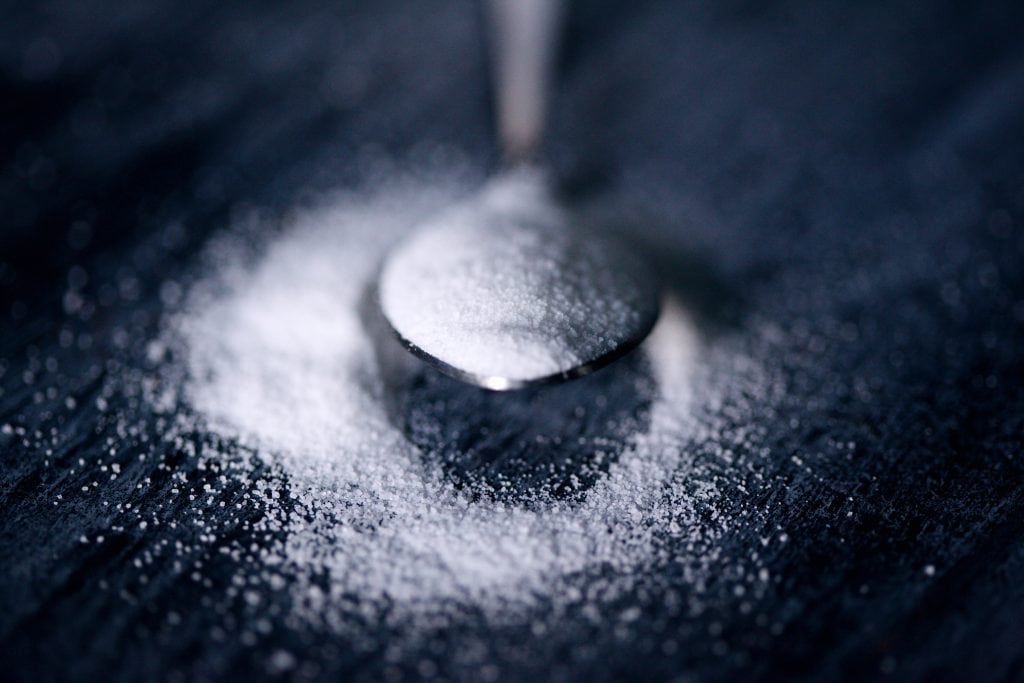
Allulose is similar to sugar on a molecular level as both are monosaccharides. This gives table sugar and allulose a similar taste. You can swap sugar for allulose in equal amounts when whipping up keto desserts.
However, the way it affects your body is entirely different from sugar.
Allulose contains four grams of carbs per teaspoon, but these are net carbs since your body doesn’t absorb them.
Allulose also feeds the good bacteria in your stomach and promotes insulin sensitivity. So if you’re looking for a healthier alternative to Splenda, try allulose.
Pros
- Your body excretes 70 percent of allulose
- It tastes like table sugar
- You reduce insulin resistance
- It’s a good option for diabetics
- There are only two calories per teaspoon
Cons
- It has a laxative effect
Stevia
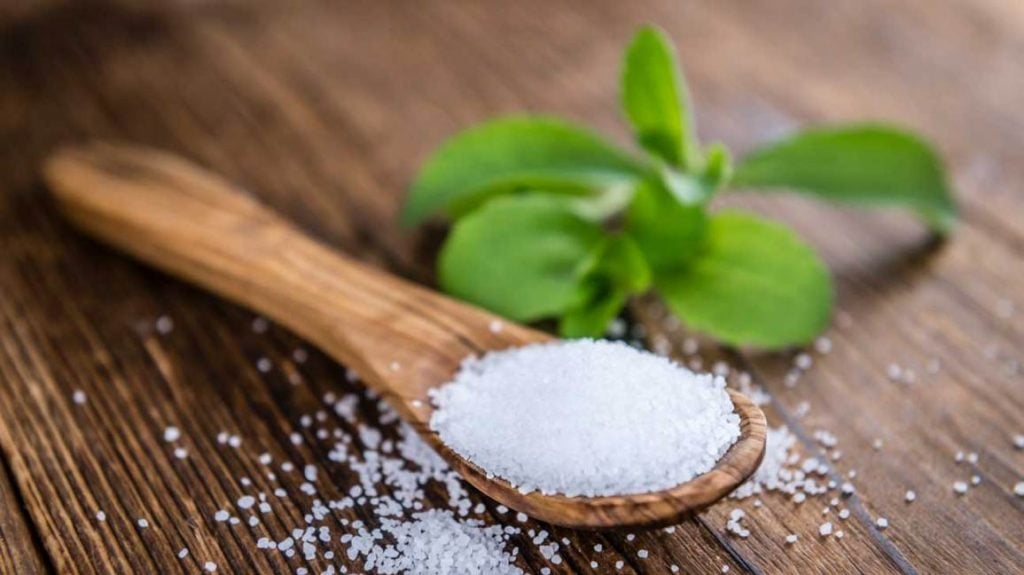
Stevia is another big yes on keto because a teaspoon contains one gram of carb. The calorie count is zero, so you won’t have to restrict consumption when trying to lose weight.
Alongside monk fruit and erythritol, stevia is my favorite sweetener. It doesn’t impact blood glucose and tastes just like table sugar.
But brands are starting to add maltodextrin to their stevia sweeteners, and you want to avoid this. Maltodextrin has a GI of 110, which is twice as much as sugar. So when you’re shopping, stick to 100 percent stevia.
Pros
- It has no calories and one gram of carb per teaspoon
- You can use it for baking and cooking
- It comes in a liquid, powder and granular form
- It stabilizes your blood sugar
- It improves your oral health
Cons
- Most stevia products contain maltodextrin
- It has a bitter aftertaste
Inulin
Inulin is one of the most fermentable fibers we can consume, making it handy on keto.
Unlike Splenda, inulin feeds the good bacteria in your gut, helping them absorb nutrients and fight off infection.
Inulin is especially beneficial for diabetics. Medical papers show it lowers blood sugar levels and promotes insulin sensitivity.
Pros
- Inulin helps you absorb nutrients
- It feeds the good bacteria in your gut
- It reduces insulin resistance
- The fiber eases constipation
Cons
- It’s 10 times less sweet than sugar
Sweeteners To Avoid On Keto
Not all alternative sweeteners are keto-friendly, so avoid these options:
- Maltitol
- Aspartame
- Xylitol
- Honey
- Coconut sugar
Maltitol
Maltitol is the worst sugar alcohol to consume on keto because it has a GI of 52, slightly below table sugar’s score of 62.
This is dangerous if you have diabetes. Maltitol triggers insulin resistance, leading to obesity and heart disease.
You’ll find maltitol in many so-called “keto” snacks since it tastes like sugar and is cheap. So it’s essential to read the label before buying keto candies and chocolates.
Aspartame
Aspartame is another artificial sweetener in most sugar-free products like soda and chocolate. However, aspartame is quite dangerous, especially if you’re sensitive to it.
Multiple well-documented studies link aspartame to chronic issues like:
- Type 2 diabetes
- Nonalcoholic fatty liver disease
- Heart disease
- Hormone-related cancers
So although you can consume aspartame without interfering with ketosis, it has damaging effects on your body.

Xylitol
Xylitol won’t trigger inflammation or upset your gut microbiome, but avoid it or limit your consumption because our tests show it spikes glucose levels.
Xylitol has a GI score of seven, which isn’t much, but it’ll still interfere with ketosis, especially if you’re preparing desserts and eating it in high amounts.
It’s also calorie dense, containing 20 calories per teaspoon. So consider lower-calorie sweeteners when trying to lose weight.
Honey
Honey may seem innocent and healthy. But like
Medical papers show that the fructose in honey goes to your liver faster than other sweeteners. This means it’s easy for your body to convert honey to fat.
The good news for all honey lovers is that you can make your own keto honey at home with a handful of ingredients. These include xanthan gum, water, a brown sugar substitute and some honey extract.
All you have to do is add these ingredients to a pot on low heat and keep whisking until it’s thick.
Coconut sugar
Coconut sugar has been spiking in popularity recently as a healthy alternative to table sugar. It’s sweet and easy to cook with. Many new keto dieters think that because coconut oil is such a superfood, coconut sugar should be okay.
However, it isn’t keto-friendly. Coconut sugar has a GI score similar to regular sugar and the calorie count is also high. So I’d suggest avoiding coconut sugar on keto.
Tell Me The Best Keto Sweetener
The best keto sweeteners are erythritol, allulose, stevia and monk fruit. Other “healthy” sweeteners might not inhibit ketosis, but they wreak havoc on your body.
For example, maltitol has a GI score of 52. And studies link aspartame to cancer, heart disease and type 2 diabetes.
With erythritol, stevia, monk fruit and allulose, you won’t have to worry about adverse side effects.

Final Thoughts On Is Splenda Keto
Although Splenda is a keto-friendly sweetener, it contains maltodextrin and other dangerous substances that raise blood sugar and insulin while triggering inflammation. It’s also unstable under high heat which can produce unwanted byproducts.
Multiple sweeteners like erythritol and stevia are far healthier and tastier than Splenda.
So if you have packets of Splenda at home, finish it since it isn’t as harmful as table sugar or maltitol. But when you’re heading to the grocery store, opt for a natural sweetener like erythritol, stevia, allulose or monk fruit because they are better all-round sweeteners.
Written by
Matt Gaedke
Matt is a former college basketball player turned computer engineer who discovered his passion for health and nutrition after cutting sugar from his diet in 2016. That year he founded KetoConnect with Megha in order to share their ketogenic lifestyle through recipes, videos, and educational content. Matt is always seeking to grow and try new things, a passion he shares with his wife and two amazing sons.

